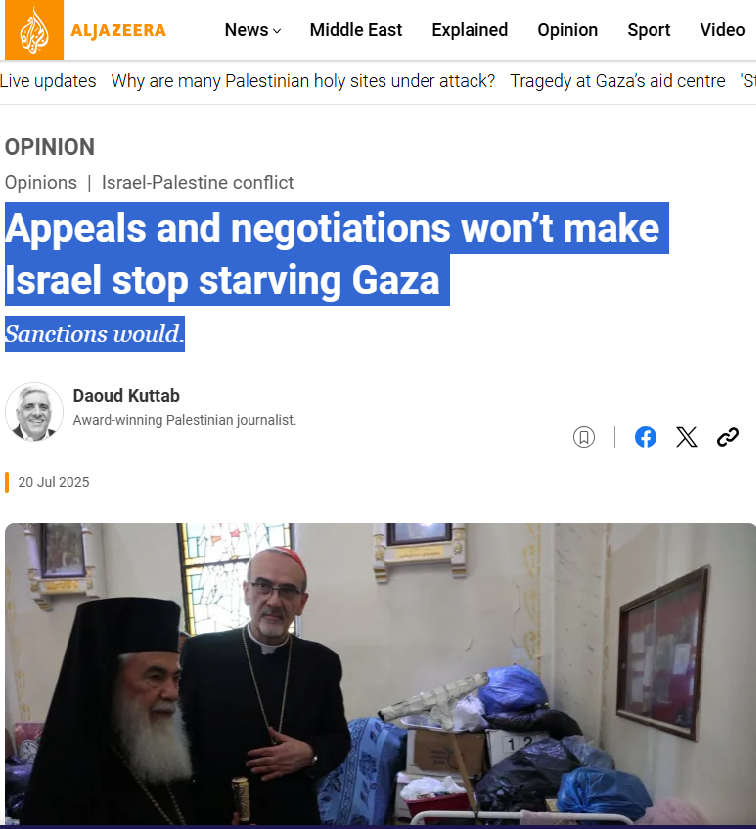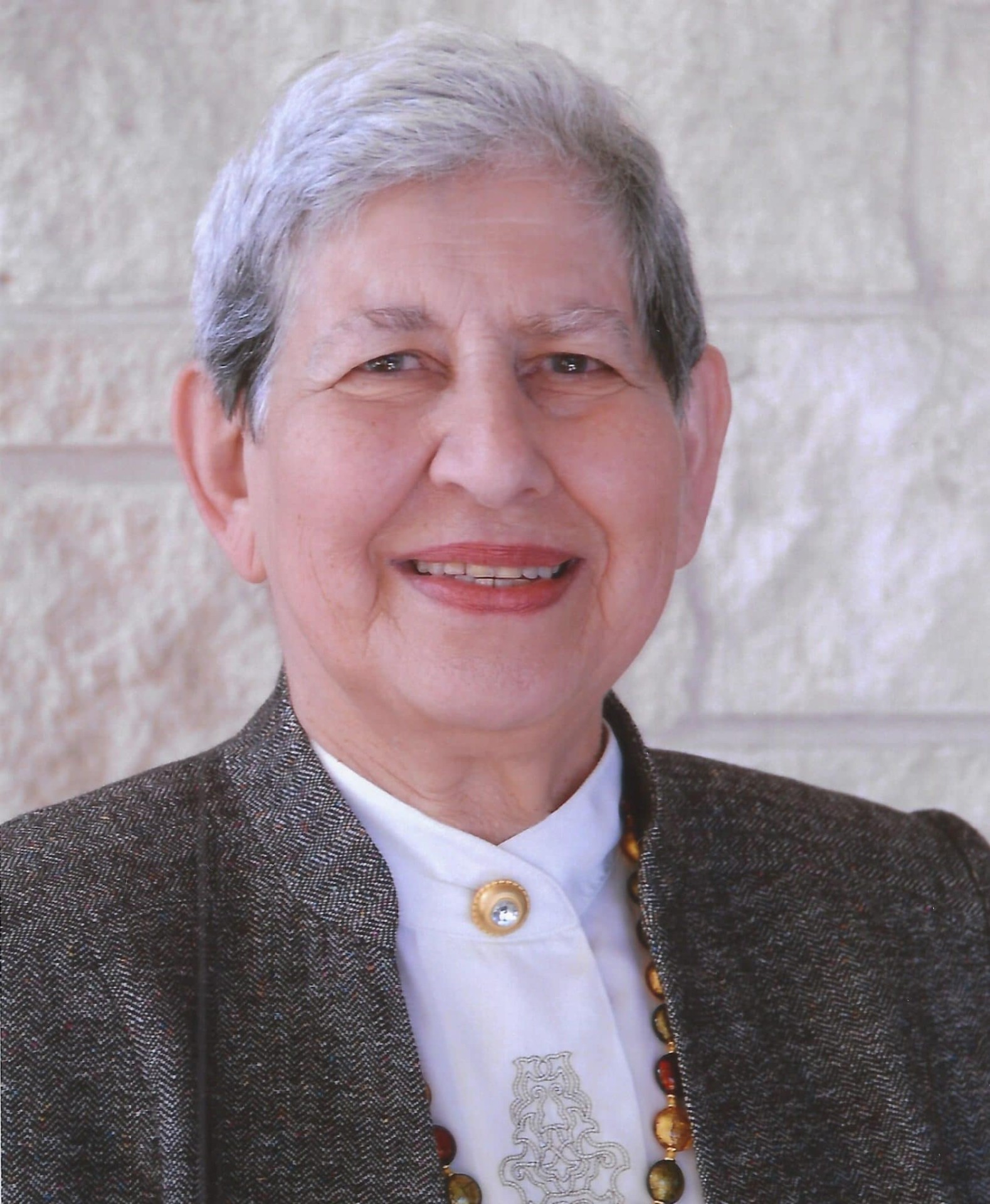
Previous Appeals and negotiations won’t make Israel stop starving Gaza

by Samia Khoury
When the word humanitarian is used to describe one of the genocidal traps laid for the people of Gaza, perhaps it’s time to update Webster’s Dictionary. Even the donkeys—Gaza’s last means of transport—are now being stolen by Israel. What’s left? What more can they think of?
Perhaps it’s a blessing to be blind and deaf these days—to be spared the agonizing scenes pouring out of Gaza. How does the world stand by while children starve to death, while the plates of Arab, Israeli, American, and European leaders overflow with food as they discuss Gaza—and, in the long run, the fate of the entire region?
“Ending all wars” was once on Mr. Trump’s election agenda. Yet every step he’s taken has aligned with the slow, calculated genocide unfolding in Gaza. To add insult to injury, even protest is now being sanctioned. Until when will the international community remain silent and inactive while children continue to die of hunger?
It takes just one hour of watching the news to understand the grim reality and the demonic plan stretching across the Middle East. Now Syria, too, is on the chopping block. Will we continue to hear lofty speeches at the UN and watch empty summit meetings while people perish—or will the international community finally act according to its mandate?
—Samia
As I was ready to circulate my short reflection, my daughter sent me the following from a colleague of hers in Gaza. How truly sad!!!!

I am at a loss—by God, I am. Staggering in disbelief like one stunned by shock.
How can a world so vast—one that folds the earth in a blink, splits atoms, and pierces the heavens—fail to save a starving soul? How does it sustain such a sinister balance, keeping an entire people teetering at the edge—never letting them fall, yet never pulling them even half a step back from the brink?
Here, a whole people are forced to choose their manner of death: torn by shells, drained by hunger, or consumed by incurable disease. This surreal city sits at the mercy of metal frames and incoming coordinates. People eat salt—if they find any—without bread. They chew pain instead of thyme and oil. They walk not in play, but in exhaustion; not in joy, but in sorrow. They wander like the lost down a road with no sign, like the trapped in a tunnel with no light.
Yes, they are hungry—but not only in their bellies. Their very souls are hollowed out. Their hearts bleed with wounds no doctor can mend. Many perish before the bombs reach them—devoured by hunger that arrived first. They die not because death has called, but because the world has gone deaf.
Crushed between the hammer of missiles and the anvil of empty pots, they carry burdens no mountain could bear: a child crying for milk, a mother dreaming of a handful of beans, a grandfather gnawing on whatever stones might sprout food, and a father unraveling at the thought of how to provide his children a single meal. Will the world explode before he finishes cooking the lentil stew—or just after, when his children wrinkle their noses in disappointment?
Now even hunger laughs. It mocks us. Crumbs were not enough—it has introduced “alternatives”: fake meat, faux milk, pretend oil, counterfeit salt. Even water has a substitute. So do power, batteries, sunlight, money, and digital payments. We have searched even for a substitute for the human being—someone capable of enduring this madness.
We now cook “substitute meals” and convince ourselves that “faith is flavor” and “patience is sweet.” But truly? Can a human being remain human amidst such substitutions? I dare say: it would take a being beyond humanity.
Yet more terrifying than empty stomachs are hollowed-out values. When hunger strikes, ethics collapse. Humanity crumbles. I’ve seen it: an angel yesterday, a devil today—clawing at his brother’s flesh for a handful of flour. I’ve heard stories that make the heart bleed: a man stabbing his cousin over an aid parcel. I’ve watched with aching eyes how hunger erases faith, folds morals, and reshapes man—not from clay—but from some pitch-black, foul-smelling substance.
So I ask: What madness is this? Is it mere famine—or a test of the world’s humanity?
How is death prepared in the kitchens of global conscience? How is hope trapped in a place the size of a sardine tin?
Crafting these words feels like pulling threads from a soul already frayed—not from lack of language, nor failure of the alphabet, but because hunger has stolen my focus… and maybe even my will to care.
No room remains in the heart for wonder, no tears in the eyes for grief, no cunning in the mind for comprehension.
How can we explain what’s happening to a world that still doesn’t see after twenty-one moons? What kind of image needs endless gazing to comprehend? Is this some encrypted Van Gogh? A Beethoven symphony that can only be understood when endured? A Nietzschean riddle requiring centuries to decipher?
A world that climbs to the moon every hour, traverses galaxies, bends time itself—yet cannot provide powdered milk to a single child? Oh, the irony of substitutions.
In Gaza, hunger is no longer just an instinct. It is a war machine. An ordeal of the soul. A moral reckoning.
Is starvation kinder than shrapnel? Is death by hunger gentler than death by bombs?
I nearly believe our Prince of Poets, Ahmed Shawqi, wrote for us when he lamented:
From the war of al-Basus to this cruel inflation—
It returns like seven harsh trials…
Is there no Joseph among the people to face this?
To calculate wisely and see the path rightly?
Your servants, Lord, have starved in Egypt—
Was it the Nile You gave them, or merely a mirage?


تكافح مجلة “ملح الأرض” من أجل الاستمرار في نشر تقارير تعرض أحوال المسيحيين العرب في الأردن وفلسطين ومناطق الجليل، ونحرص على تقديم مواضيع تزوّد قراءنا بمعلومات مفيدة لهم ، بالاعتماد على مصادر موثوقة، كما تركّز معظم اهتمامها على البحث عن التحديات التي تواجه المكون المسيحي في بلادنا، لنبقى كما نحن دائماً صوت مسيحي وطني حر يحترم رجال الدين وكنائسنا ولكن يرفض احتكار الحقيقة ويبحث عنها تماشيًا مع قول السيد المسيح و تعرفون الحق والحق يحرركم
من مبادئنا حرية التعبير للعلمانيين بصورة تكميلية لرأي الإكليروس الذي نحترمه. كما نؤيد بدون خجل الدعوة الكتابية للمساواة في أمور هامة مثل الإرث للمسيحيين وأهمية التوعية وتقديم النصح للمقبلين على الزواج وندعم العمل الاجتماعي ونشطاء المجتمع المدني المسيحيين و نحاول أن نسلط الضوء على قصص النجاح غير ناسيين من هم بحاجة للمساعدة الإنسانية والصحية والنفسية وغيرها.
والسبيل الوحيد للخروج من هذا الوضع هو بالتواصل والنقاش الحر، حول هويّاتنا وحول التغييرات التي نريدها في مجتمعاتنا، من أجل أن نفهم بشكل أفضل القوى التي تؤثّر في مجتمعاتنا،.
تستمر ملح الأرض في تشكيل مساحة افتراضية تُطرح فيها الأفكار بحرّية لتشكل ملاذاً مؤقتاً لنا بينما تبقى المساحات الحقيقية في ساحاتنا وشوارعنا بعيدة المنال.
كل مساهماتكم تُدفع لكتّابنا، وهم شباب وشابات يتحدّون المخاطر ليرووا قصصنا.